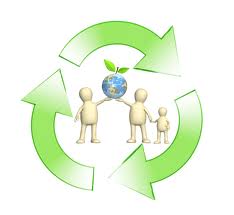 I wrote a piece for the Guardian two years ago arguing that what was missing from the sustainability debate was a focus on the human element of organizations. I questioned how an organization could be truly sustainable if the people connected with it were not treated in a sustainable manner too, and that those organizations who put people at their heart were likely to be more successful.
I wrote a piece for the Guardian two years ago arguing that what was missing from the sustainability debate was a focus on the human element of organizations. I questioned how an organization could be truly sustainable if the people connected with it were not treated in a sustainable manner too, and that those organizations who put people at their heart were likely to be more successful.
In the meantime this kind of debate has broadened to move us on a little since then, attempting to further shift organizational thinking and behaviour beyond its current constraints towards one that should embrace the human dimension more readily. But despite a growing narrative around why we need to move away from the current organizational paradigm – from corporate leaders such as Paul Polman at Unilever, the global consultancy profession and politicians and regulators – organizations are still largely playing around the edges of something that we ought to be regarding as of paramount importance.
What is missing from this narrative is something more substantial, which better defines our way forward, making the move from the current paradigm not just another rhetorical exercise, or one that is based primarily on fear i.e. to avert catastrophic failure in organizational and societal terms – to one that is positively compelling and of real value for everyone.
At a recent IHRM orientation class, we showed our latest group of future Maturity practitioners a definition:
“Maturity is the extent to which an organization realizes its human potential such that it maximizes the value it can create. Human potential relates to all people connected with the development, production and supply of an organization’s goods and services. Value relates to the organization itself (e.g. financial, quality, service, efficiency etc.) and value generated by the organization in a societal context (e.g. economic, well-being, environmental).
This is our starting point and maximising Societal Value our goal, which we believe the most Mature organisations know is mutually inclusive to reaching their own potential in value terms. Maturity then is not about creating sustainable organisations per se, but a sustainable organisation cannot be truly realised unless it is a highly Mature one.
Moreover, with ten core dimensions of Maturity (our 10 Pillars ), Maturity provides both a foundational framework and an easily understood, meaningful way forward, that is both attainable and potentially measurable – helping us re-work the notion of a “triple bottom line” and make it more of a realistic prospect, particularly now that we have embedded Maturity in the form of an Organizational Rating.
However, we need more organizations that we can hold up as role models for this Mature way forward. One exemplar for IHRM is Toyota, which continues to be copied by many others today. Its’ own market value greatly exceeds its peers , recognising that its’ organisational Maturity (which existed decades before IHRM) generates value over and above its’ more tangible assets. And it is no coincidence that Toyota is also seen as a global leader in Societal Value terms – in this respect its’ environmental record stands out against other global firms similar to its size and reach , and Toyota remains at the forefront of technology to move society away from the damage caused by fossil fuels.
But we also need new organisations to show us a new direction. In the UK healthcare sector, Circle Healthcare appears to be doing this – giving us a new model and a more mature approach that can potentially achieve what society needs and wants, but in a different form to the existing system. In this respect, smaller firms can positively disrupt systems that cannot change or fail to change quickly enough.
In a Maturity context, organizational size, sector and ownership should be irrelevant to outcome, although each may help or hinder to some extent a maturity-led journey. What is important is that there are value-based lessons to learn from Maturity which any organization can use to embark on a strategy that embraces it.
At IHRM we want to share our framework, methods and our ideas. We are ‘open source’. We believe that the more people and organizations who take this route, the better our world will be in value terms; for individuals, organisations and society itself. In this respect, Maturity should be good for our planet, or at least the human aspect of it.
Comments are closed